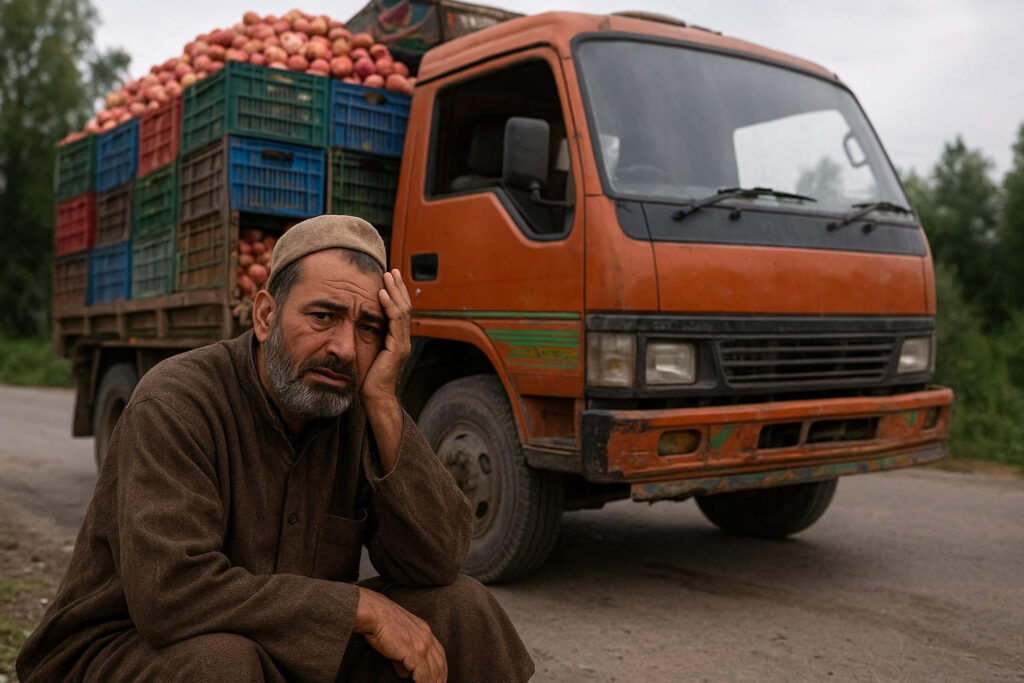Without alternate routes, cold storage, or reliable rail freight, Kashmir’s apple industry remains hostage to one fragile road.
By Aamir Wani
Every autumn, as the apple orchards of Kashmir turn red with ripened fruit and families prepare for their most crucial harvest of the year, the Valley finds itself caught in a familiar trap. Truckloads of apples, the lifeline of Kashmir’s rural economy, remain stranded for days on the Srinagar–Jammu National Highway (NH-44), the only all-weather road that connects the region with the rest of India. Officials may blame landslides caused by heavy rains, or cite construction, widening, or tunnel work as unavoidable disruptions. Yet for the grower, the result is always heartbreakingly the same: rotting fruit, shrinking profits, and the crushing realization that another year’s hard work may go in vain.
Apples in Kashmir are not just fruit. They are a way of life, a pillar of survival, and the backbone of an economy that supports nearly 3.5 million people. The industry contributes close to 10 percent of Jammu and Kashmir’s GDP. In many villages, a single season decides whether children will continue their schooling, whether a family can afford medical treatment, or whether loans taken in hope of a good harvest will be repaid. This is not just about trade—it is about existence. And yet, every harvest season seems cursed by the same story of broken connectivity, as if the prosperity of thousands must annually be left to chance on a fragile road carved into treacherous Himalayan slopes.

The testimonies of growers from Shopian, Sopore, Pulwama, and Kulgam echo the same frustrations year after year. In one season, rains bring landslides near Ramban; in another, traffic curbs are imposed because of widening work or tunnel construction. Some years, farmers are told the road must remain closed for “safety clearance.” Whatever the excuse, it rarely eases the anguish of those who wait as their perishable produce inches towards markets in Delhi, Chandigarh, or Mumbai. Apples do not wait for explanations. A delay of three or four days can slash prices drastically. A week’s delay can wipe out entire truckloads, turning a season of hope into one of despair.
The damage is not limited to the farmer alone. Transporters bleed money as trucks stand idle. Local mandis get flooded with low-quality fruit sold at throwaway prices, while cold storage facilities overflow far beyond capacity. Middlemen seize the crisis to their advantage, forcing farmers to sell at exploitative rates. And beyond the economics lies the immeasurable human cost: when fruit spoils, it is tuition fees lost, medical bills unpaid, dowries delayed, and livelihoods shattered. For countless families in rural Kashmir, apple orchards are their only source of income. The fear that their year’s labour may simply rot on the highway gnaws at them, season after season.
This recurring crisis also sows seeds of disillusionment among the younger generation. Many young people, watching their parents struggle and lose, no longer see farming as a future. They migrate to towns for odd jobs or leave the Valley in search of stability, abandoning orchards that once defined their families’ pride. Over time, this disaffection threatens to weaken Kashmir’s very identity as the apple-rich valley it is known to be.
A question that lingers bitterly on every grower’s lips is why the problem returns every year, and always during the harvest. If landslides are predictable, why is there no contingency plan? If construction work is necessary, why can’t fruit trucks be given priority passage? If road transport is so vulnerable, why isn’t there a push to expand rail freight directly from Kashmir to major Indian markets? The answers, if any, are vague and unsatisfactory. Authorities point to the challenges of mountainous terrain and unpredictable weather, but farmers see only neglect. They feel their voices are ignored until anger spills onto the streets, after which temporary measures are announced. By then, however, the damage is done, and the season is already lost.
Long-term solutions have been proposed repeatedly but seldom implemented. Alternate routes such as the Mughal Road could be expanded and maintained to provide relief during blockages. Cold-chain infrastructure could be significantly scaled up to help fruit withstand delays. Rail connectivity—direct links from the Valley to consuming states—could reduce dependency on a single precarious highway. Yet year after year, progress moves at a glacial pace, leaving farmers to wonder if their plight is truly a priority.
As another harvest unfolds, the grim cycle repeats. Trucks laden with apples line up along broken mountain roads, their cargo bruising and rotting with each passing day. In those heaps of spoiling fruit lies more than wasted produce—it is the slow withering of dreams, the erosion of livelihoods, and the crushing of hopes that have for generations blossomed in Kashmir’s orchards. The question that haunts the Valley is simple but searing: how much longer must its farmers pay the price of poor planning and fragile infrastructure? Until those in power deliver lasting solutions, Kashmir’s apple growers will continue to watch their toil decay on the highway, along with their faith in a system that seems to fail them every year.
The views expressed in this article are solely those of the author and do not necessarily reflect the opinions or views of this Magazine.
Leave a Reply